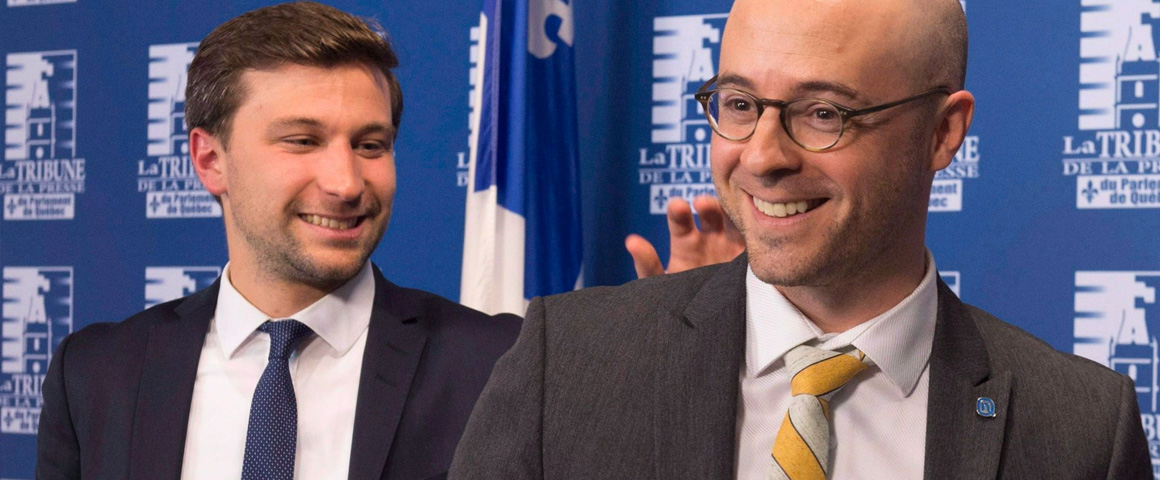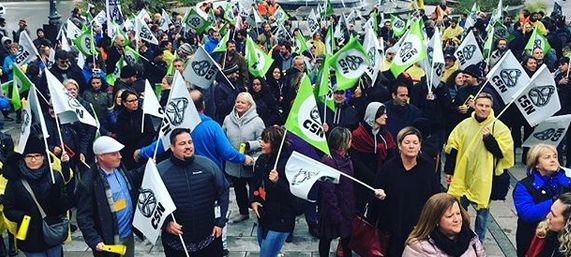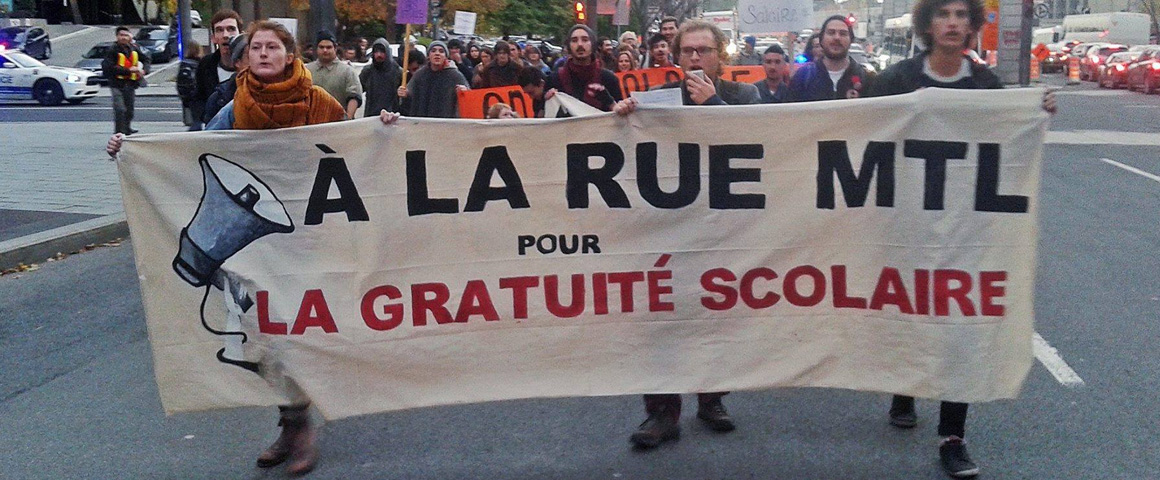“Independence and a Convention to arrange details!” Such was the call of William Lyon McKenzie who, in December 1837, led hundreds of men to take up arms and initiate the Reformers’ Rebellion, English-Speaking Canada’s bourgeois revolution against British rule. However, this same phrase also sums up pretty well the outcome of the Congress of Québec Solidaire, held last December 2nd and 3rd.
This meeting was officially aimed to update the programme of the progressive organisation for the upcoming Québec elections next fall. However, the main debate was around the merger of QS with another political party, Option Nationale.
Option Nationale was created by Jean-Martin Aussant, a former trader who made his career – and his money, no doubts about that – in London, before recycling his active life into politics as a Parti Québecois National Assembly member, before resigning because he found it to tepid in the promotion of independence. His newly created party adopted a programme similar to QS on many social aspects, and presented itself as an independentist organisation, stating that ON prioritizes a “regime change” (i.e. independence) over “social transformation”.
One could speculate a lot on ON’s real purpose and what actual forces were behind its creation. But its bottom line effect was to split the progressive vote, and contribute to pressure on Québec Solidaire to adopt a more pro-independence stance from the left, which objectively favours the Parti Québécois agenda.
On the national question, Québec Solidaire was also a sovereigntist party in favour of Independence. Unlike ON and PQ though, it called for a Constituent Assembly that would have the mandate of writing a Constitution, of which the outcome wouldn’t necessarily be separation. In other words, it kept a door open to other proposals to be evaluated by the Assembly, including the Parti Communiste Quebecois (PCQ) proposal of an equal and voluntary partnership of all nations in Canada.
This position was the fruit of a series of debates in which PCQ’s interventions were decisive. Indeed, when the ancestor of Québec Solidaire, the Union des forces progressistes (UFP) was created, the PCQ’s proposal regarding the new organisation’s position on the national question was that there would be a majority position (in favour of independence) and a minority position not necessarily in favour. Both stances would agree that in any case, independence should be a means to achieve a social programme, rather than a goal in itself. This compromise was eventually adopted, allowing QS to achieve the unity of the left beyond the national question, a position that one could see as historic in the political landscape of present-day Québec.
From the beginning however, this compromise was constantly attacked. Pressures from a more independentist (and opportunist) fringe of the organisation, to “clarify” the QS position on the outcome of the Constituent Assembly, became more frequent as the party grew, electing three MNAs and hitting 20% in vote intentions.
During the 2016 Congress, a proposal was put on the table to revise the position on the Constituent Assembly, trying to have the delegates accept that its mandate would be closed to any other proposal than independence regarding the national question. The PCQ, along with other voices that included a strong statement by openly independentist and famous trade-unionist Paul Cliche, worked at different levels to convince the membership to maintain the initial position. In the end, delegates rejected the proposal of a closed mandate for the Assembly, reiterating their attachment to the initial goal of the party, unity of the left and progressive forces beyond the national question.
One year later, in May 2017, the leadership of QS tried to force through once again this debate, despite the clear outcome of the previous year’s congress. This time however, the plan was better tailored, presented through the possibility of an anti-austerity/anti-Liberal electoral alliance between the Parti Québécois, Québec Solidaire and Option Nationale. This idea was also rejected by the delegates, but another motion to negotiate the possibility of a merger between Québec Solidaire and Option Nationale was approved.
This proved to be the bombshell that the leadership of QS crafted to sabotage the party’s internal democracy, and bypass the decision of two successive Congresses that clearly reaffirmed the party’s founding principles of a Constituent Assembly with an open mandate, and of independence being a tool to achieve social justice, to “move beyond» capitalism”. The merger in itself was not the objective, the goal was to change the political line of QS.
Indeed, when the negotiating committee presented its report, it basically asked the membership to adopt a “take it or leave it” proposal. On pretty much all aspects, QS literally capitulated to Option Nationale’s demands – including the one on independence and the necessity to adopt a closed mandate for the Constituent Assembly. To many delegates, who sometimes were not even against the merger in principle, this was comparable to an “omnibus bill”. The merger however, was finally approved by over 80% of the delegates.
This new development in Québec Solidaire’s political line is not just a small change, as the leadership tried to present it. It is a significant qualitative change, that will impact not only the politics of the party, but politics in Québec in general. The leadership mobilised tremendous resources to ensure that what was presented as a merger between two “progressive and independentist” forces was adopted by the Congress. Some members were kept away from pre-Congress discussions, and ridings where members were tempted to vote against the merger were visited by famous leaders. As we heard from a young woman’s testimony during the Congress’ sessions, even intimidation was used against strong opponents of the merger.
This marks a fundamental break with the practices of the organisation, but more profoundly, it means that the right-wing has won the battle in Québec Solidaire. These forces are now in a good position to pretend to be a “PQ 2.0”, a new version of the Parti Québécois, which it would not oppose on social issues, but on the fact that QS-ON is now the “real” independentist force in Québec, since the actual PQ does not call for independence in the short term.
More importantly, it means that the equation between independence and the left forces, which was a very handy tool for the bourgeoisie, will not be challenged anymore. This idea that progressive people have to first fight for independence and support the PQ in all circumstances led to disaster for Québec’s working class: it even led the labour movement to sign on to the ultra-liberal deficit zero deal proposed by Lucien Bouchard that ended up in massive cutbacks in public services (mainly health and education), adding up to almost $4 billion. In a cruel twist of irony, it was precisely against this concept that Québec Solidaire was formed at the end of the 1990s at the initiative of the PCQ and other left forces, and was starting to be successful at breaking through as an influential force amongst social movements.
However, now that independence is the number one priority of the Constituent Assembly, and the goal in itself of the new formation, and that the social issues are “details” to be arranged by the Assembly, now that the new paradigm is the union of independentist forces rather than the union of progressive forces, we can ask ourselves: will QS-ON continue to challenge with the same strength the PQ’s record in terms of austerity measures and racist projects such as the Charter of Values? Or could it be tempted, in a case where it held the balance of power, to collaborate with the PQ’s orientation against the Liberals or CAQ?
Pierre Fontaine, leader of the PCQ, has said that “a major red line was crossed. By basically imposing independence on the Constituent Assembly, without any previous discussion, this new position closes all possibility to nation-to-nation dialogue with Québec’s Indigenous nations. It also means that QS cannot be the vehicle for a truly democratic solution to the national question, a proposal that would break with the status quo while defending the unity of the working class across the country, instead of its division by promoting independence. This will certainly have an impact on the next electoral campaign, which is likely to be polarised around identitarian politics, and more likely so if QS-ON doesn’t take on the challenge of opposing all islamophobic, xenophobic and racist measures. We shouldn’t forget that Option Nationale is clearly in favour of the ban of religious signs on public servants, including for teachers.”
“This is a sad outcome,” he adds. “Communists though should take pride in the work the PCQ achieved in UFP and Québec Solidaire over the past 20 years: the creation of a rather strong political force challenging the PQ from the left, organising the campaign of the first Indigenous candidate in a Québec election, etc.”
For now, says Fontaine, “it is obvious that our relationship with QS will have to be debated during our next National Congress to be organised next spring. It is obvious that we will have to change our policy towards QS-ON and focus on how to consolidate our basis and strengthen the PCQ. At the same time, despite the questions we have about the new policies of QS-ON and its role in Québec’s political landscape – which is in a process of recomposition – we will still be called to work with QS-ON. After all, it still is much more to the left than any other parliamentary force in Canada, and a lot of strong activists are still members of this organisation.”



